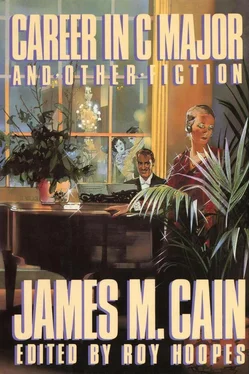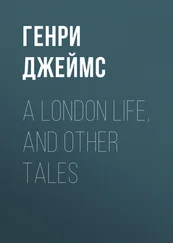I got up, and laughed, and he and Schultz and I went out and had a drink. He took red wine with seltzer. They don’t drink much, but a wop tenor likes red ink.
The afternoon of the performance I put off lunch till three o’clock, then went out and had a good one. I came back to the office and vocalized my voice. It came up quick, and felt good. I was beginning to get nervous. They all get nervous, but this was different from what I had felt before. It had a little tingle to it. I felt I was good. I walked up to the hotel and it was about half past four. I lay down and got a little sleep.
It seemed funny to be putting the make-up on without Cecil bobbing in to give me the double O, but I got it in place, and put on the funny clothes, and tried my voice. It was still up, and was all right. Horn came in, looked me over, and nodded. “The contracts are ready.”
“You got them with you?”
“My secretary’s bringing them over. I’ll be in with them after the show. How do you feel?”
“I feel all right.”
There came a knock on the door, and a little wop in a derby hat came in and stood beside me where I was at the table and began to talk about how some of my admirers wanted to hear me sing, but their tickets would cost them a lot, and more stuff like that, and I didn’t know what the hell he was talking about, except it seemed to be some kind of a touch. Horn was behind him. He nodded and held up ten fingers. I got my pocketbook, passed out $10 and the guy left. “What was that?”
“The claque.”
“What’s the claque?”
“A bunch of self-elected noise-makers, that you pay to clap when you sing, and whether they do or not nobody knows. If you don’t pay, they’re supposed to take some terrible revenge, like blowing whistles at you or something like that. Whether they do or not, nobody knows. I generally go along with them, and so do the singers. They’re harmless, just one of those things that opera has like a dog has fleas.”
“There was nothing like that in the American Scala.”
“Maybe they took care of it for you.”
He went, and I wished everything that came up didn’t remind me of Cecil. I knew who had taken care of it all right, without being told. And I knew why. Knowing the applause was paid, or any part of it was paid, would have taken all the fun out of it for me. So it was taken care of. I tried my voice again, then remembered she had told me when it was right to leave it alone. There didn’t seem to be any help for it. Everywhere I turned, she was standing there beside me.
I went down, then walked over and had a look at the calls. Then my heart skipped a beat. On the first two calls at the end of the second act, we were all in it, me, Parma, the Gilda, and the people in the small parts. Then on the next two it was just the Gilda and me. And then it said:
Mr. Borland (If)
I walked out on the stage to get the feel of the set, and the tingle was clear down to my feet. I made up my mind there wasn’t going to be any if about it. I was going to get that call or split my throat.
Parma was right in the Questa o Quella , so Act I got off to a swell start, and they ripped right along with it. I got a hand when I came on, whether it was the claque or the publicity I don’t know, but I don’t think it could have all been claque. There had been a lot of stuff in the papers about me. I was singing under my own name now, and it seemed to strike them as a good story that a big contractor should turn into a singer, but anyway it made me feel good, and I hit it right in the scene with the second baritone, and we got a fine curtain. Hippodrome opera wasn’t like Metropolitan opera. It was 99-cent opera, and that audience acted the way it felt. The second scene of the act went even better. The bass was a pretty good comic, and I fed to him all I could, so we got away with the duet in swell shape. The Gilda was all right in the Caro Nome , not like Cecil, but plenty good. The duets went well, and we got another good curtain, and were on our way.
When it came to the scene before the courtiers, the one I had rehearsed with the choristers, I did it a little different than I had been doing it. I got a break at the start. The Ceprano had one of these small, throaty baritones, and when it came to the place where I was to mock him on Ch’hai di nuovo, buffon , I shot it back to him just the way he had given it to me, and it got a big laugh. I had them then, and I chucked tone quality out the window. The first part of the scene I shouted, talked, and whispered, till I got to the place where they slammed me back on my hunkers. Then I remembered Bohème. I came crawling back, and plucked the hem of Marullo’s doublet, and gave them tears. I sang it dolce , and then some. I opened every spigot there was, and at the end of it I was flat on the floor, hanging on to the high F like my heart would break, and finishing off like I could just barely make myself do it. There wasn’t any pause then. The first “bravo” came like a pistol shot before I even got through, and then they came from all over the house, and the applause in a swelling roar. I lay there, the heart bowed down, for quite a time. There were thousands of them, and it took them longer to quiet down than in other places. The Gilda came running on, then, and we did the duet, and the curtain came down.
Did I get that call? I’m telling you I did. I took the Gilda out twice, and then Parma aimed a kick at me, and then there I was, in front of them all alone, trying to remember how to bow. There’s nothing like it.
I went to my dressing room, walked around, and was so excited I couldn’t even sit down. I wanted to go out there and do it all over again. It didn’t seem two minutes before they called me, and I went down for the last act.
The Gilda and I did the stuff that starts it, and then went off, and Parma had it to himself for the La Donna è Mobile. I think I’ve given you the idea by now that that dumb wop is a pretty good tenor. He knocked them over with it, and by the time the Maddalena came on, and the Gilda and I went out again for the quartet, we were in the homestretch of one of those performances you read about. So the quartet started. Well, you’ve heard the Rigoletto quartet a thousand times, but don’t let anybody tell you it’s a pushover. The first part goes a mile a minute, the second part slower than hell, and if there’s one thing harder to sing than a fast allegro it’s a slow andante, and three times out of five something happens, and many times as you’ve heard it you haven’t often heard it right. But we were right. Parma started it like a breeze, and the Maddalena was right on top of him, and the Gilda and I were right on top of her, and we closed out the allegro with all our cylinders clicking and the show doing seventy. Parma laid it down nice on the andante, and we were right with him, and we brought it home just right. We were right on the end of the stick. Well, that stopped the show too. They clapped, and cheered, and clapped some more, and Schultz threw the stick on me to go on, and a fat chance I could. We had to give them some more. So after about a minute, Schultz played the cue for the andante, and Parma started again.
He started, and the Maddalena came in, and the Gilda came in, and I came in. It seemed to me we got in there with it awful quick, but I was so excited by that time I hardly knew where I was, and I didn’t pay much attention to it. And then all of a sudden I had this awful feeling that something was wrong.
I want you to get it straight now, what happened. The andante is the same old tune, Bella figliav dell ’ amore , that you’ve heard all your life and could whistle in your sleep. The tenor sings it through once, then he goes up to a high B flat, holds it, comes down again, and sings it over again. The second time he sings it, the contralto comes in, then the soprano, then the baritone, and they’re off into the real quartet. Well, our contralto, the Maddalena, was an old-time operatic hack that had sung it a thousand times, but something got into her, and instead of waiting for Parma to finish that strain once, she came in like she would on the repeat. And she pulled the Gilda in. And the Gilda pulled me in. You remember what I told you about speed? Up there you’ve got no time to think. You hear your cue, and you come in, and God help you if you miss the boat. So there was Parma and there was the orchestra, in one place in the score, and there were the Maddalena, the Gilda, and me, in another place in the score, and there was Schultz, trying like a wild man to straighten it out. Not a whisper from the audience, you understand. So long as you keep going, and do your best, they’ll give you a break, and even if you crack up and have to start over they’ll give you a break — so long as you do your best. They all want to laugh, but they won’t — so long as you keep your head down and sock.
Читать дальше












